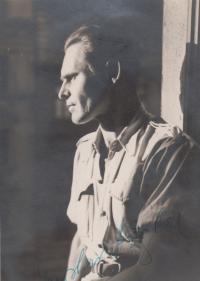“One day I found an advert in the newspaper that the Melantrich publishing house was inviting authors to send their unpublished book manuscripts. It was to be a big contest for the best book for young readers. I have finished my book Hoši od Bobří řeky (“Boys from the Beaver River” – transl.’s note) at that time and so I just sent it in and waited for the outcome. After some time I received a letter that the topic was not suitable for a book, but that if I agreed, they would publish it in installments in the children’s supplement of the Sunday paper České Slovo (“Czech Word”) which was called Slovíčko (“Little Word”). If I wanted, they would publish it on regular basis and pay me 30 hellers per line. My desire was to see my book in print, and so I was disappointed because now I would not have my book, but on the other hand I thought that it was fine that at least I could earn some money on it. I made some calculations on paper to see how many lines of text that would be and I just sent it to them. I even drew some accompanying illustrations and they really published them. In order to make this text even longer, I tried various ways to stretch the word count. For example, there was a sentence: ´He laughed heartily.´ I rewrote it: ´He laughed out loud heartily and sincerely.´ The sentence overflew to the second line and I earned 30 hellers more right away. The critics then wrote that my writing style was ornate and elaborate. And this was thanks to these extra words which I had cunningly inserted in the text. A year or two later, Melantrich made another call for texts, but unfortunately I learnt about it too late. I learnt about it in March or April, and the deadline for the manuscript’s submission was by the end of June, 30th June. Well, in haste I put together a book, which I titled Blue Life of Jiří Dražan and I sent it anonymously to the publishing house, so that the committee would not know who sent it. I kept waiting what would happen. The results were to be announced around 15th September. I still waited and I was impatient, although I was not too sure whether I would succeed or not, but I kept waiting. I believed in myself, perhaps too much. We were out of home for four or five days with my mom and my brother and when we returned, I bought a box of kremroles (puffed pastry filled with whipped cream – transl.’s note) instead of a proper lunch. When I came home, there was an express letter in the postbox. At that time, there were no notices, and the postman would just drop an express letter directly into your postbox. ´Melantrich Publishing House´ was written on the envelope, and so I quickly opened it. I put the box with kremroles somewhere, I didn’t even realize where. The letter read: ´The contest committee ruled not to award the first prize, but to divide it between three authors instead. One part goes to Mr. J. V. Pleva for the book Boys with a Dynamite, second part to Mr. Josef Heyduk and his book Boy with a Jar, and the third part to Jaroslav Foglar, who wrote the book Blue Life of Jiří Dražan. These three books will be published in print.´ I rejoiced. Now I began looking for the kremroles, and I could not find them, because I had placed them on the oven. I would always remember my brother whenever I saw this oven. I ate the kremroles and went to pick up my prize money. I forgot to say that the money I was to receive was an incredibly enormous amount for that time. It was ten thousand Czech crowns. I calculated that if I was to receive one third, I would get exactly three thousand three hundred and three crowns and thirty-three hellers. I went to the cashier – there was a surly old geezer sitting behind a glass window in the Melantrich building. I knocked at the window. ´What do you want?´ I said: ´I am here for the money, I won one third of the literary prize, you see…´ I handed him the letter, which he dropped to the floor and as he bent to pick it up, he hit his head against the edge of the table, and he became even more angry. But he did reach for the wallet – it was a huge wallet – and he pulled out three thousand three hundred and thirty-three crowns and that was it. I said: ´Sir, that’s not all, is it?´ He replied: ´Well, what else? I gave you the money right here!´ I told him: ´But there are still thirty-three hellers missing.´ He argued: ´But we don’t do it this way, don’t you know that we round it off?´ But why didn’t he round it up to say thirty-five crowns instead of rounding it down to thirty-three, which he gave me without the thirty-three hellers? I still cannot understand what the man did with the extra one crown, which he also must have received from the boss for the payment of the prize money. He was to divide this one-crown for the three of us, and he thus swindled us. Anyway, this was a second or third author’s pay which was shortened to me. I want to add that they eventually changed the title of the manuscript which won me one third of the prize; the title Blue Life of Jiří Dražan seemed too long and too literary for them, and so they simply changed it to The Port is Calling, and I accepted it, because later I began to like it even more than the original title.”

